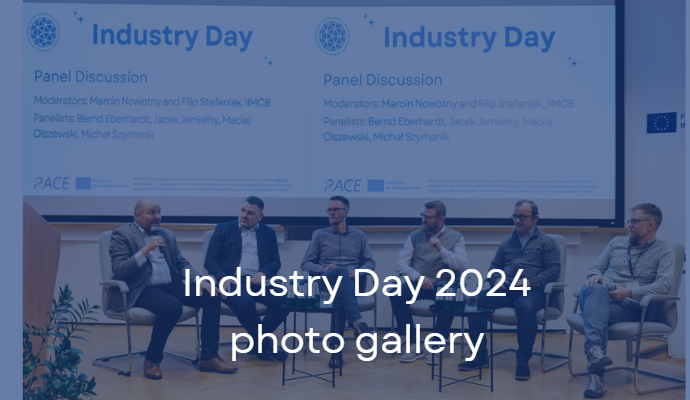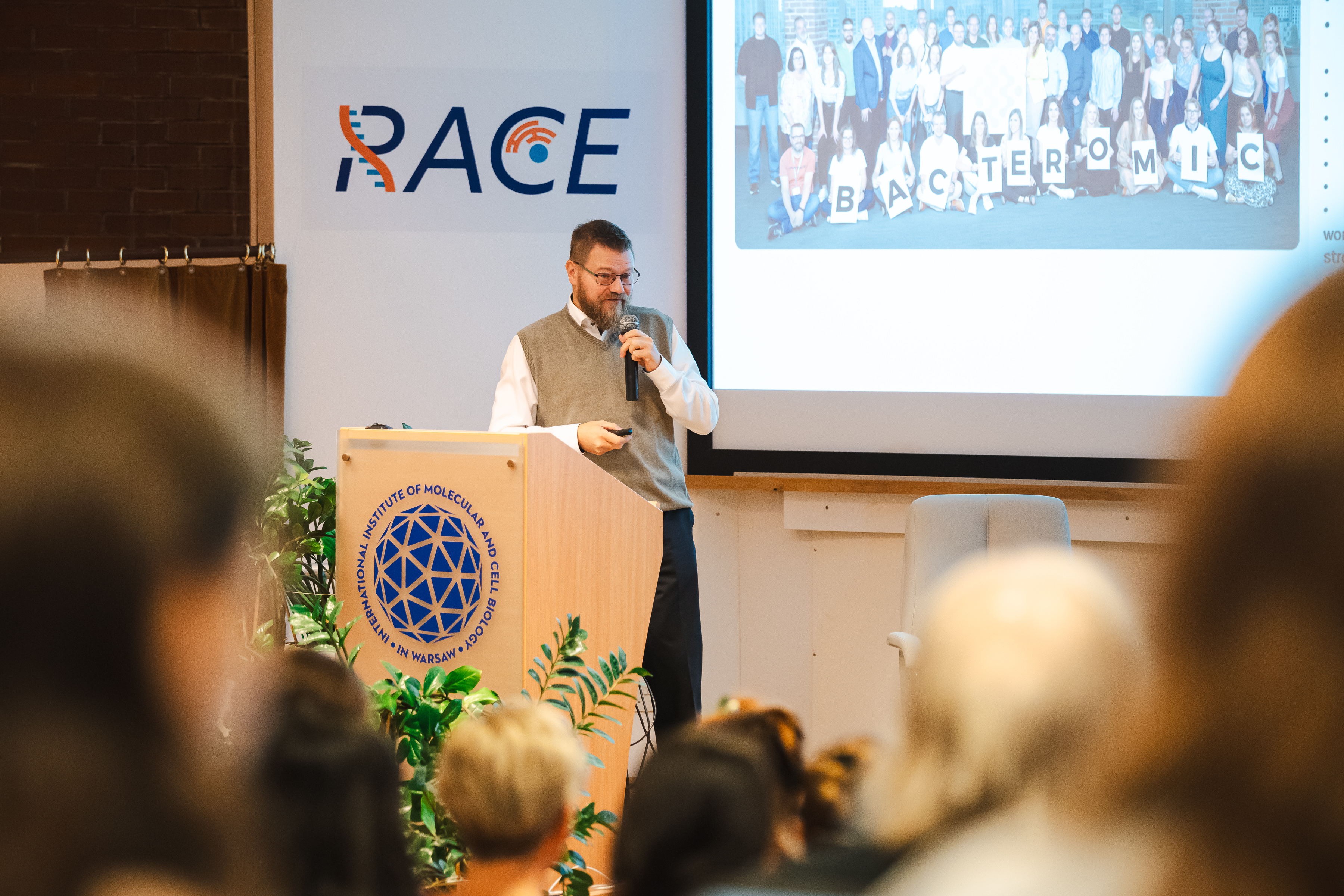Industry and Academia: In Search of Synergy
Bridging the efforts of science and business is the recipe for growth – concluded representatives of innovative enterprises and scientists during the first edition of the Industry Day conference at the IIMCB.
The event, which gathered numerous individuals from the biotechnology sector, provided a valuable opportunity to strengthen relations between scientists and entrepreneurs, while also helping to define fields of collaboration.
“Moving from science to industry is sometimes referred to as crossing over to the ‘dark side’,” said Mr. Bernd Eberhardt, CEO of BacterOMIC. “However, it’s important to remember that scientists work on both sides,” he added.
Mr. Eberhardt presented his company's mission and goals: developing microbiological diagnostic solutions that enable fast and accurate identification of bacterial infections. The company's efforts are also focused on detecting antibiotic resistance. BacterOMIC employs experts in microbiology and biotechnology, among other fields.
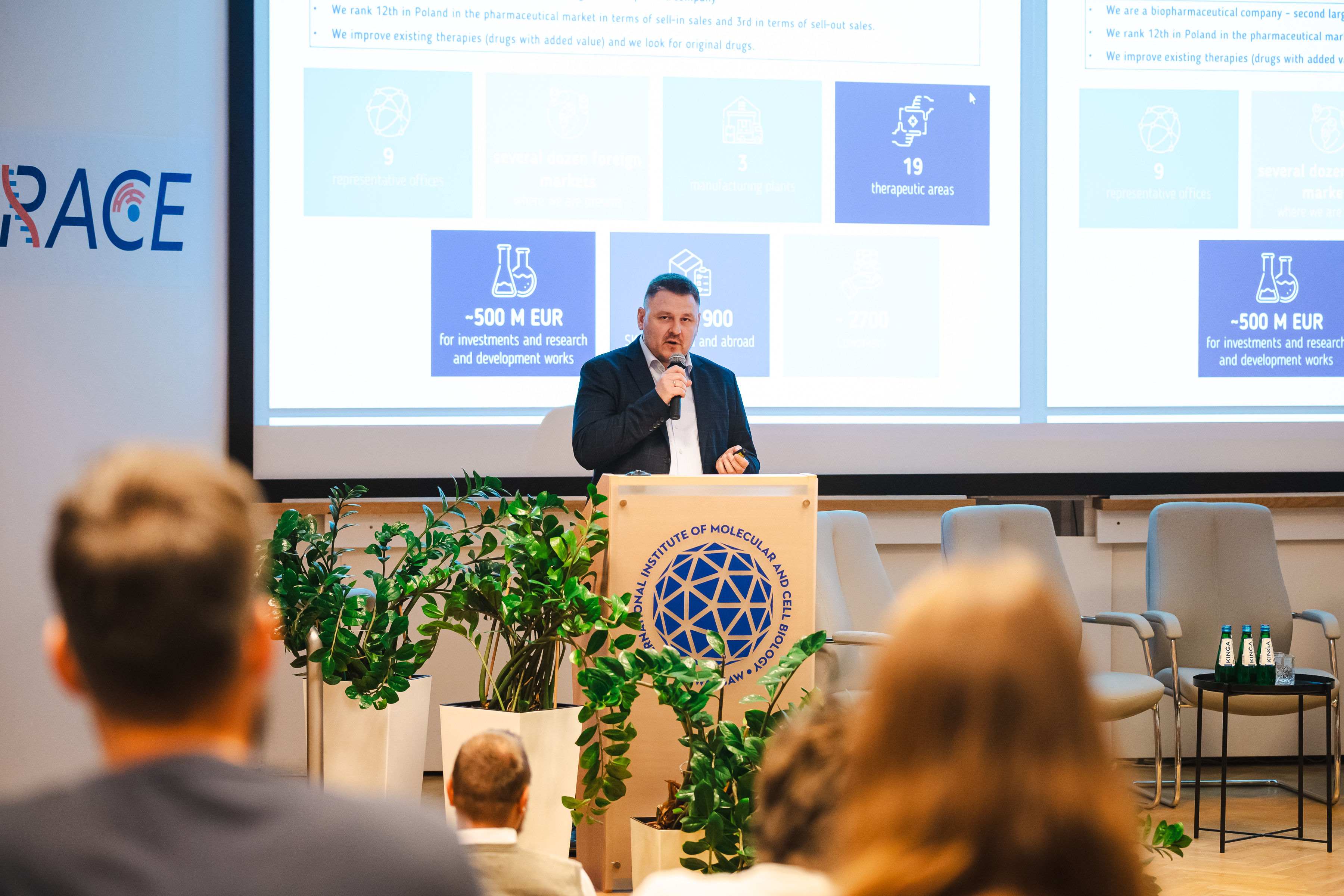 Dr. Michał Szymanik, Adamed Pharma
Dr. Michał Szymanik, Adamed Pharma
The next speaker, Dr. Michał Szymanik, Business-Science Collaboration Manager at Adamed Pharma, presented his company. Adamed, the second-largest Polish pharmaceutical company, is distinguished by its innovation and development of original drugs. The company focuses on 19 therapeutic areas, operates 3 production plants, and employs 2,700 people, including over 200 scientists. The company holds 250 patents and 90 technical solutions. In 2023, Adamed spent 37.5 million euros on research and development.
Dr. Szymanik discussed molecules that are candidates for oncological, neuropsychiatric, obesity, and diabetes drugs. He also revealed that Adamed Pharma is working on an mRNA/VLP-based vaccine project. The department responsible for new drugs employs a professor, a habilitated doctor, 18 PhDs, and 14 MSc holders. "We have been recognized as the best employer in the pharmaceutical and biotechnology sector for two consecutive years (2023 and 2024)," emphasized the Adamed representative.
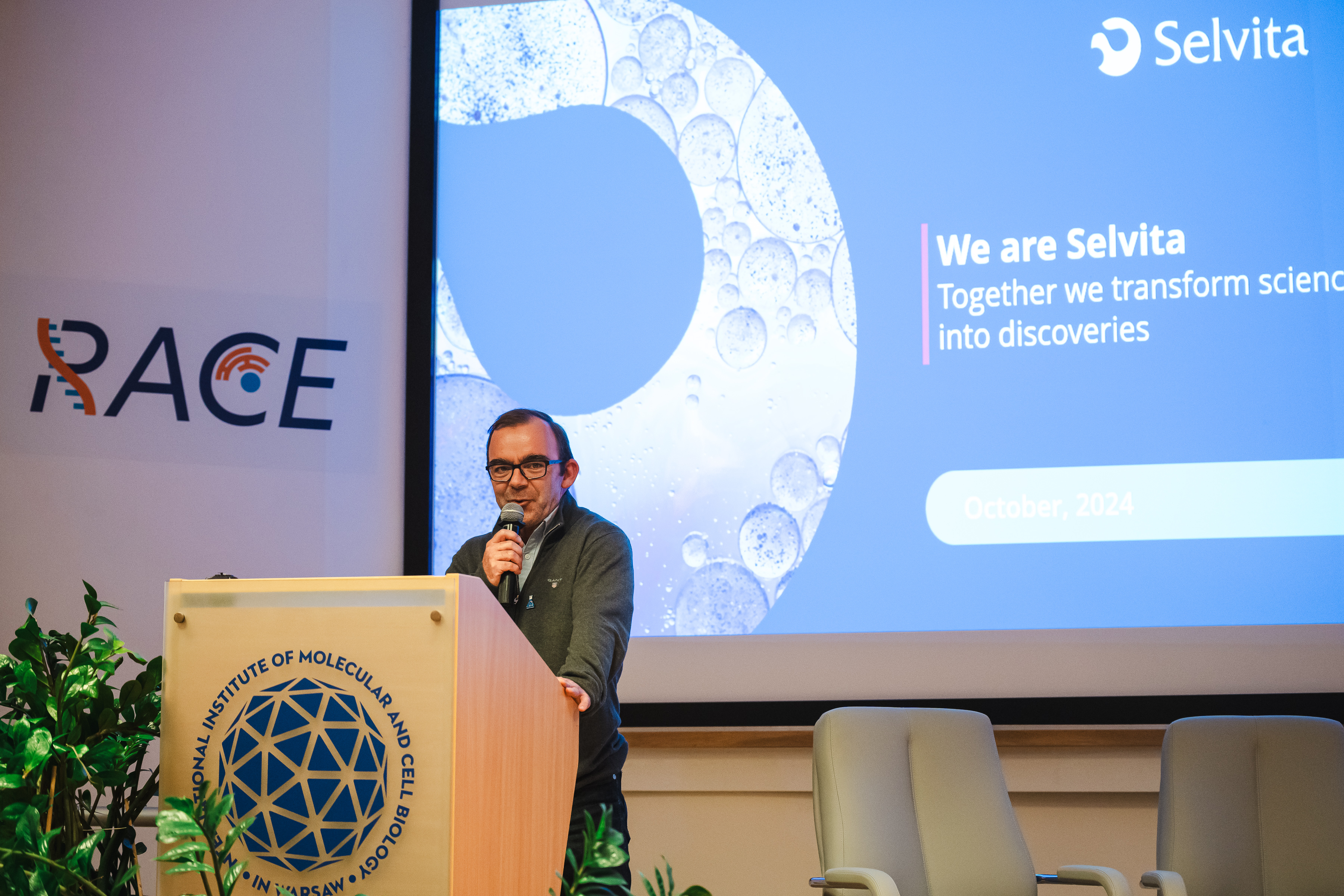
Dr. Maciej Olszewski, Selvita S.A.
The next presentation was delivered by Dr. Maciej Olszewski, Associate Director of In Vitro Pharmacology and Translational Research at Selvita S.A. The company's motto is "Together we transform science into discoveries." This mission is realized across 7 locations on two continents, employing a total of 900 people. As highlighted by Dr. Olszewski, 39% of the company's scientists hold doctoral degrees. Selvita S.A. supports integrated drug development projects from concept to the clinical or preclinical candidate stage. The company offers comprehensive services in integrated drug discovery, advanced in vitro and in vivo research capabilities (integrated pharmacology and translational research), and state-of-the-art animal research facilities accredited by AAALAC-I and OLAW.
"Why work with us?" Dr. Olszewski asked rhetorically. "We have extensive research infrastructure and laboratories, and we promote knowledge-sharing initiatives. We are passionate about science and learning, which drives us every day to develop new therapies," he summarized.
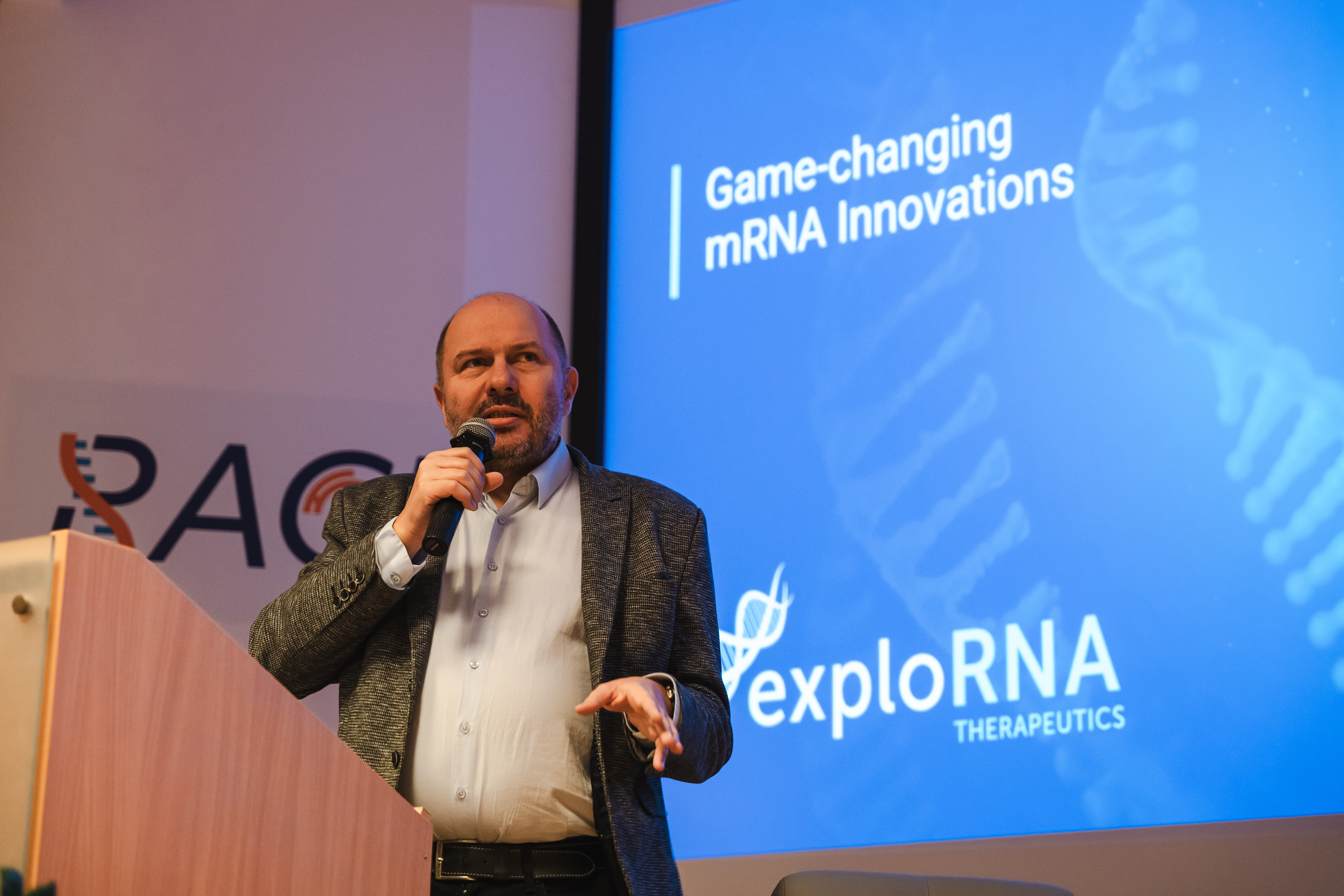
Prof. Jacek Jemielity, ExploRNA Theurapeutics
The final presentation at Industry Day was given by Prof. Jacek Jemielity, President of ExploRNA Therapeutics and Director of the Centre of New Technologies at the University of Warsaw. Founded in 2019, ExploRNA Therapeutics holds expert competencies in mRNA innovation research and development. As revealed by Prof. Jemielity, the company has a strong patent portfolio consisting of six patent families. Its laboratories and offices are located in Warsaw and Białystok. ExploRNA is proud of its library of over 100 cap analogues and its know-how in high-quality mRNA synthesis. The company is currently working on preclinical therapeutic programs. Offering two innovative products, ExploCap and AvantCap, ExploRNA has attracted global attention, resulting in over 40 collaborations and partnerships in the USA, EU, and Asia. Prof. Jemielity’s company is the first from Eastern Europe to receive a grant from the Bill & Melinda Gates Foundation, amounting to over 800,000 USD. ExploRNA employs 30 experts, including 4 professors, 8 PhDs, and 4 PhD candidates. In his talk, Prof. Jemielity discussed the role of mRNA in gene therapy, including antigen delivery, protein supplementation, nuclease delivery, regenerative medicine, and cell therapies.
Fostering Collaboration Through Dialogue
After the presentations, a discussion panel moderated by Prof. Marcin Nowotny and Dr. Filip Stefaniak from the IIMCB was held. The discussion touched on the opportunities and limitations of startups, science funding, two-way transfers (not only from science to industry but also the more problematic return to Academia), and artificial intelligence.
Prof. Jacek Jemielity considers AI a powerful tool but advises caution when using it for designing and synthesizing cap analogues. "We still don’t have enough data to fully engage AI, but it has made tremendous progress," argued the scientist.
"From our company’s perspective, we can create agents that accelerate processes, obtain data faster, or extract interesting fragments from scientific articles," said Dr. Michał Szymanik from Adamed. "Our bioinformatics and data analysis team uses these tools. However, we must remember that the large language models we all use hallucinate and require verification."
Mr. Bernd Eberhardt admitted to using AI to structuralize and speed up work, but also noted that the results require verification. "In our diagnostic system, we use an AI model in the analyzer, and we use various algorithms and models to track bacterial growth. AI needs a lot of data to function well. That’s why we often ‘feed’ our databases. However, we face the challenge of how to create technical documentation based on AI," admitted the Scope Fluidics BacterOMIC representative.
According to Dr. Maciej Olszewski from Selvita S.A., despite the mistakes made by large language models, the correction of AI-generated materials is faster than creating them from scratch. He also mentioned AI image analysis, stating that AI can "see" new features that humans may miss.
The debate also touched on how to improve the chances of PhD students in the job market, while recalling the importance of the quality of scientific work. Prof. Marcin Nowotny emphasised that excellence in basic research has a direct impact on industry. Dr. Michał Szymanik confirmed that the biggest innovations come from the world of science. "Why is Poland not as innovative as Western countries?" asked the Adamed representative rhetorically. "Because we have a ‘brilliant’ tradition of not investing in basic research." He also mentioned that he had signed an open letter regarding NCN funding. Prof. Marcin Nowotny expressed satisfaction with this declaration and called on the gathered representatives of biotechnology companies to sign the petition.
“Industry Day conference provided a unique opportunity for the scientific and industrial communities to get to know each other better, which is crucial for technology transfer,” commented Dr. Kornelia Mikuła, Head of the Technology Transfer Office at the International Institute of Molecular and Cell Biology in Warsaw. "I am glad that the role of basic research in generating innovation was raised during the conference. For most modern therapies and drugs, their development path can be tracked back to basic research conducted at scientific institutes. The development of therapies, drugs, and diagnostic products requires time and a range of specializations, with distinct competencies at each stage of development. Here, the strengths of Academia and industry can complement each other, building partnerships that can lead to measurable results and implementations," said the expert from the IIMCB.
"When I returned to Poland 16 years ago, the industrial landscape was very limited. Basically, there was only Adamed and a few small companies just starting out. Now, the choices are vast, and this potential will continue to grow. I hope the Industry Day format will continue," concluded Prof. Marcin Nowotny.
The first Industry Day conference was organized on October 8, 2024, by the International Institute of Molecular and Cell Biology in Warsaw.



